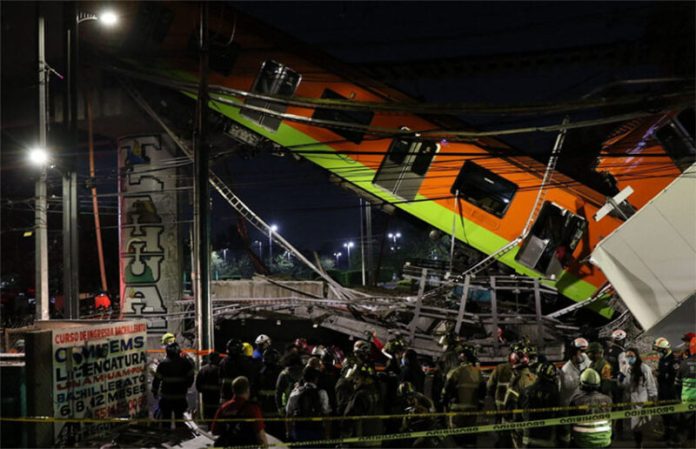Former Mexico City government officials and personnel of companies that built Line 12 of the capital’s Metro system will face homicide charges over the deaths of 26 train passengers who were killed when an elevated section of the line collapsed on May 3.
The Mexico City Attorney General’s Office (FGJ) said Thursday it was opening criminal cases for homicide, injury (almost 100 people were injured in the accident) and damage to property.
“This prosecutor’s office has the evidence to charge a number of people and companies who were in charge of ensuring there would never be cause for a collapse,” Attorney General Ernestina Godoy told a press conference.
“… The FGR will … present criminal accusations for homicide, injury and damage to property. … From that, a judge will notify and summon the probable culprits to begin their criminal process,” she said.
Godoy didn’t name ex-officials who are going to face charges, citing respect for due process. Line 12 of the Metro, the system’s newest, was built during the 2006-12 Mexico City government led by Marcelo Ebrard, who is now foreign minister.
A consortium that included Mexican firm Ingenieros Civiles Asociados (ICA), Carso Infrastructure and Construction – owned by billionaire businessman Carlos Slim – and French rail company Alstom built the line, which includes an underground stretch and an elevated section.
Godoy said the companies could avoid legal processes if they reached agreements with the Mexico City government and provided compensation to victims of the tragedy, the capital’s worst ever Metro disaster.
“Some companies that participated in Line 12 showed from the very beginning their interest in participating in the mitigation and repair of effects from the collapse,” she said.
The FGR’s announcement that it will pursue criminal charges against those responsible for the collapse came after it concluded its own investigation into the accident.
The Attorney General’s Office concluded there were flaws in the design of the line and that construction work was shoddy. Metal studs in the overpass that collapsed were poorly placed and welding was deficient, it determined.
The FGR’s findings aligned with those of a Norwegian company hired to conduct an independent investigation and with many of those outlined in a New York Times analysis.
Line 12, which runs from Mixcoac in the capital’s southwest to Tláhuac in the southeast, was plagued by problems since it opened in 2012.
FGJ spokesman Ulises Lara said Thursday that flaws in the construction were impossible to detect during routine maintenance because they were hidden within the structures that supported it.
“The grave construction error with respect to … the poor placement and bad welding of studs … could not have been detected in inspections because they’re not visible,” he said.
The Mexico City government said last month the line would undergo a range of repairs that would be completed in one year. President López Obrador announced in June that Carlos Slim would cover the repair costs.
“[Slim] came … to [the National Palace] to tell me that he’ll take charge of the reconstruction of the entire [elevated] section, taking care of all the necessary safety [measures] without it costing the people anything, without asking for anything from the [federal] budget. That’s his commitment,” he said.
